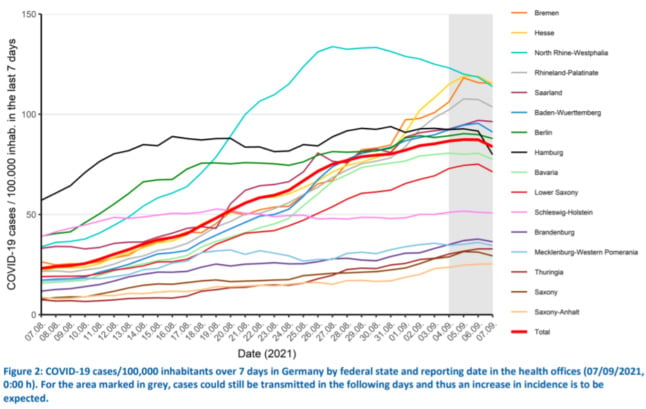Germany's Covid incidence sinks for second day in a row

Germany's 7-day incidence of Covid infections dropped for the second consecutive day on Wednesday. It currently stands at 82.7 per 100,000 people.
On Tuesday, the 7-day incidence of infections per 100,000 people was 83.8, while on Monday, this figure was 84.3.
A week ago on Wednesday, the 7-day incidence stood at 75.7 per 100,000 people.
The number of daily cases, meanwhile, has risen only slightly against the previous week, with 13,565 new Corona infections reported to the Robert Koch Institute within one day on Wednesday compared to 13,531 on September 1st.
Die 7-Tage-#Corona-Inzidenz in 🇩🇪 sinkt von 83,8 auf 82,7.
➡️ zweiter Rückgang in Folge - das hat es seit Anfang Juli nicht mehr gegeben@welt pic.twitter.com/VUy2tnv1oY
— Olaf Gersemann (@OlafGersemann) September 8, 2021
Health experts will be watching closely to see if the slight downward trend continues over the coming days.
Just over a week ago, on August 31st, the weekly incidence of Covid infections dropped for the first time since early July, but quickly resumed its upward curve the next day, suggesting that the reduction had been a momentary blip.
READ ALSO: Covid infections fall in Germany for first time since July
As of Tuesday, however, the rate of reproduction ('R' rate) which reveals how many people are infected by one person infected with Covid, was estimated to be 0.92.
If the R rate is above 1, Covid infections continue to rise, while if it remains at below 1, infections drop.
An R rate of 0.92 means that, for every 100 people with Covid, 92 more become infected.
Bremen has highest incidence of German states
According to figures released by the Robert Koch Institute (RKI), the slight downward curve is reflected in several states across Germany - particularly those with high incidences.
In their situation report on Tuesday, the RKI released the below chart indicating that North Rhine-Westphalia, Hesse, Bremen, Berlin, Brandenburg, Hamburg, Lowery Saxony and Rhineland-Palatinate were all on a downward curve.
READ ALSO: How much longer will the pandemic continue in Germany?
Nevertheless, the public health authority cautioned that - due to reporting delays at the weekend - more cases could be reported in the coming days, which would once again drive up the incidence in several of these states.

Source: Robert Koch Institute
Of Germany's 16 states, Bremen has recently overtaken North Rhine-Westphalia as the state with the highest incidence of Covid infections, with 117.6 weekly infections per 100,000 people.
With a weekly incidence of 113.6, Hesse takes the second spot, while North Rhine-Westphalia come in at third place with 109.4 weekly infections per 100,000 residents.
The state with the lowest 7-day incidence of Covid infections is Saxony-Anhalt, where - at 25.3 per 100,000 people - the incidence is still below the critical '35' threshold.
The fellow eastern states of Thuringia, Brandenburg, Saxony and Mecklenburg Western-Pomeria also have incidences under 40.
Hospitalisations continue to rise
With the incidence remaining at a high level - and more than a third of the German population still unvaccinated - health experts are still concerned about the number of hospitalisations and Covid-related deaths in Germany.
Writing on Twitter, Welt journalist and data expert Olaf Gersemann explained that the number of Covid patients in intensive care beds had gone up almost 300 percent since the end of July.
Die Zahl der Covid-19-Fälle auf Intensivstationen ist seit dem 29.7. von reduziertem Niveau aus um 288% gestiegen.
Weil der 7-Tage-Schnitt der ü35-#Corona-Fälle weiter steigt, ist damit zu rechnen, dass die ITS-Belegung weiter zunimmt - zumindest in den nächsten 2 Wochen.@welt pic.twitter.com/tdVDxFFcJa
— Olaf Gersemann (@OlafGersemann) September 8, 2021
In the RKI's situation report on Tuesday, the 7-day incidence of hospitalisations had risen slightly to 1.69 per 100,000 people, up from 1.64 the previous day.
Gersemann believes this figure will continue to rise for at least the next two weeks.
The number of deaths has also risen. On Wednesday, the RKI recorded 35 Covid-related deaths in 24 hours, compared to 23 the previous week.
Intensive care units facing 'overload'
In parts of the country where the incidence is much higher than the national average, virologists are warning that large numbers of unvaccinated patients are leading to overburdened intensive care units and shortages of crucial equipment.
Speaking to the Düsseldorf-based Rheinische Post on Wednesday, Ulf Dittmer, the director of virology at Essen University Hospital, warned of an overload of intensive care units in the face of rising cases among the unvaccinated.
READ ALSO: Germany considers Covid vaccination campaign relaunch to convince the undecided
"We are slowly damaging the health system for ourselves," he said, adding that Germany should have a conversation about compulsory vaccination.
In his clinic, the number of patients with severe symptoms is 23, 20 of whom are unvaccinated, the youngest being 20 years old.
Hospitals in North Rhine-Westphalia have already run out of capacity for treating patients heart-lung machines (ECMO), meaning doctors face difficult choices about which patient they connect to the machine, Dittmer said.
While the 7-day incidence has been used to guide new rules and regulations for much of the Covid pandemic so far, politicians have recently pivoted to a more flexible system that takes into account hospitalisations and vaccinations as well.
Comments (2)
See Also
On Tuesday, the 7-day incidence of infections per 100,000 people was 83.8, while on Monday, this figure was 84.3.
A week ago on Wednesday, the 7-day incidence stood at 75.7 per 100,000 people.
The number of daily cases, meanwhile, has risen only slightly against the previous week, with 13,565 new Corona infections reported to the Robert Koch Institute within one day on Wednesday compared to 13,531 on September 1st.
Die 7-Tage-#Corona-Inzidenz in 🇩🇪 sinkt von 83,8 auf 82,7.
— Olaf Gersemann (@OlafGersemann) September 8, 2021
➡️ zweiter Rückgang in Folge - das hat es seit Anfang Juli nicht mehr gegeben@welt pic.twitter.com/VUy2tnv1oY
Health experts will be watching closely to see if the slight downward trend continues over the coming days.
Just over a week ago, on August 31st, the weekly incidence of Covid infections dropped for the first time since early July, but quickly resumed its upward curve the next day, suggesting that the reduction had been a momentary blip.
READ ALSO: Covid infections fall in Germany for first time since July
As of Tuesday, however, the rate of reproduction ('R' rate) which reveals how many people are infected by one person infected with Covid, was estimated to be 0.92.
If the R rate is above 1, Covid infections continue to rise, while if it remains at below 1, infections drop.
An R rate of 0.92 means that, for every 100 people with Covid, 92 more become infected.
Bremen has highest incidence of German states
According to figures released by the Robert Koch Institute (RKI), the slight downward curve is reflected in several states across Germany - particularly those with high incidences.
In their situation report on Tuesday, the RKI released the below chart indicating that North Rhine-Westphalia, Hesse, Bremen, Berlin, Brandenburg, Hamburg, Lowery Saxony and Rhineland-Palatinate were all on a downward curve.
READ ALSO: How much longer will the pandemic continue in Germany?
Nevertheless, the public health authority cautioned that - due to reporting delays at the weekend - more cases could be reported in the coming days, which would once again drive up the incidence in several of these states.

Hospitalisations continue to rise
With the incidence remaining at a high level - and more than a third of the German population still unvaccinated - health experts are still concerned about the number of hospitalisations and Covid-related deaths in Germany.
Writing on Twitter, Welt journalist and data expert Olaf Gersemann explained that the number of Covid patients in intensive care beds had gone up almost 300 percent since the end of July.
Die Zahl der Covid-19-Fälle auf Intensivstationen ist seit dem 29.7. von reduziertem Niveau aus um 288% gestiegen.
— Olaf Gersemann (@OlafGersemann) September 8, 2021
Weil der 7-Tage-Schnitt der ü35-#Corona-Fälle weiter steigt, ist damit zu rechnen, dass die ITS-Belegung weiter zunimmt - zumindest in den nächsten 2 Wochen.@welt pic.twitter.com/tdVDxFFcJa
In the RKI's situation report on Tuesday, the 7-day incidence of hospitalisations had risen slightly to 1.69 per 100,000 people, up from 1.64 the previous day.
Gersemann believes this figure will continue to rise for at least the next two weeks.
The number of deaths has also risen. On Wednesday, the RKI recorded 35 Covid-related deaths in 24 hours, compared to 23 the previous week.
Intensive care units facing 'overload'
In parts of the country where the incidence is much higher than the national average, virologists are warning that large numbers of unvaccinated patients are leading to overburdened intensive care units and shortages of crucial equipment.
Speaking to the Düsseldorf-based Rheinische Post on Wednesday, Ulf Dittmer, the director of virology at Essen University Hospital, warned of an overload of intensive care units in the face of rising cases among the unvaccinated.
READ ALSO: Germany considers Covid vaccination campaign relaunch to convince the undecided
"We are slowly damaging the health system for ourselves," he said, adding that Germany should have a conversation about compulsory vaccination.
In his clinic, the number of patients with severe symptoms is 23, 20 of whom are unvaccinated, the youngest being 20 years old.
Hospitals in North Rhine-Westphalia have already run out of capacity for treating patients heart-lung machines (ECMO), meaning doctors face difficult choices about which patient they connect to the machine, Dittmer said.
While the 7-day incidence has been used to guide new rules and regulations for much of the Covid pandemic so far, politicians have recently pivoted to a more flexible system that takes into account hospitalisations and vaccinations as well.
Join the conversation in our comments section below. Share your own views and experience and if you have a question or suggestion for our journalists then email us at [email protected].
Please keep comments civil, constructive and on topic – and make sure to read our terms of use before getting involved.
Please log in here to leave a comment.